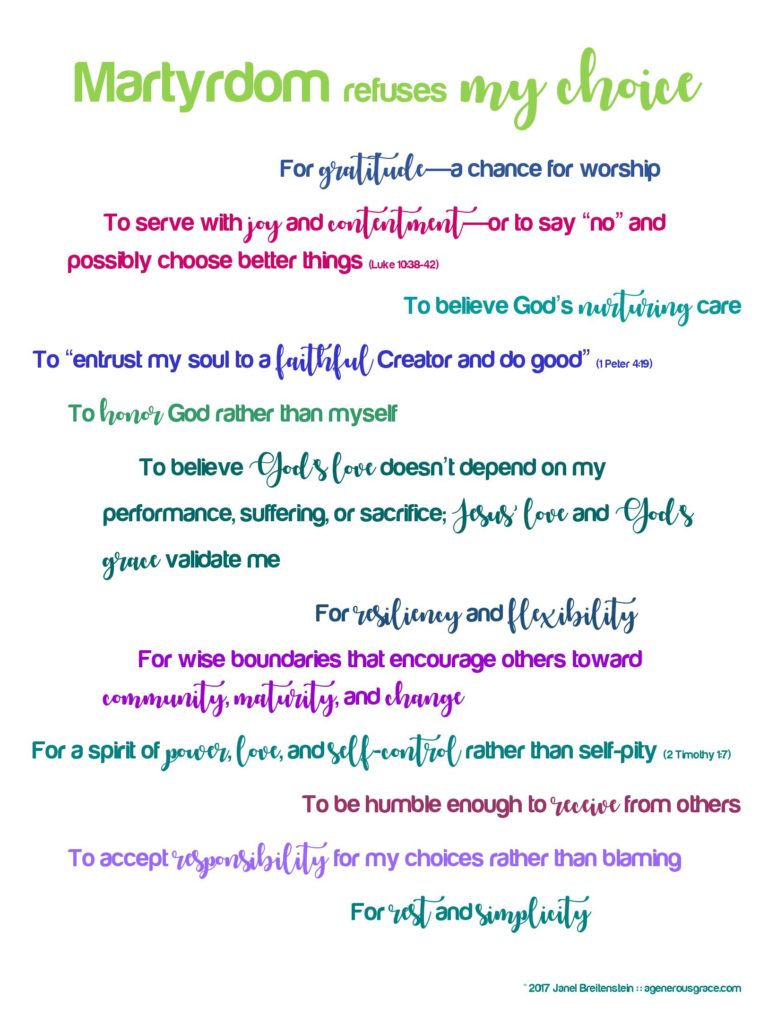 It was on my birthday that I was finally convicted: Something needed to change.
It was on my birthday that I was finally convicted: Something needed to change.
So my birthday falls on a holiday. As much fun as that sounds to people under the age of twelve–it can mean celebration is an afterthought in a blizzard of school activities and family hoopla. Somehow, as an adult, that translates into a level of embarrassment: wishing for a slice of that pie on a day already blurred with excitement.
So that morning, we added to our run-of-the-mill morning chaos all the other to-do’s we were cramming into our schedule. That’s on top of what you probably face in your own morning: the compulsory sibling squabble, at least one bad attitude (with six of us, including one hormonal cycle and one teenager, odds are always good), one miscommunique, one child leaving early for choir practice. Despite the tender well-wishes of my kids and husband, when the door closed on a silent house and sinkful of dirty dishes, I confess to thinking, I hate my birthday. I hated a somewhat unreasonable desire expectation for more.
Is it okay to be disappointed? Sure it is. (Here’s a little of how I draw the line between whining and honest expression.)
But in my disappointment, I chose self-pity. (It’s different from self-compassion.) That’s when the Holy Spirit laid it on me: My constant tendency toward martyrdom. I decided that this year would be the year when I decided this indulgence of mine was as sinful and destructive as God sees it to be.
Martyrdom: That feeling of finding identity in how much I sacrifice or suffer, often summed up as “poor me.” Martyrdom often associates sacrifice with personal superiority: I’m a better person when I suffer or give something up.
Perhaps the most famous biblical not-dead martyr? Martha. (Jonah had a good chapter of self-pity, too.) I understand Martha’s feeling of
- relationships being less-than-mutual
- of her being a task list and a role rather than a person
- of overcommitment
- of “why am I doing all the work again?”
- of choosing blaming and resentment, even bitterness, rather than other choices
“Could I be overfunctioning?”
Because martyrdom is a choice: a choice of mindset; a choice of priorities. I’ve been chewing lately on Geri Scazzero’s thoughts on overfunctioning lately:
Overfunctioning is doing for others what they can and should do for themselves.
-Geri Scazzero*
I’m not sure I agree with all her sentiments–but I still think I have a lot to learn from them. Scazzero argues that overfunctioning for others
- breeds resentment,
- perpetuates immaturity (it can cause “disintegration of the other’s being”–inhibiting someone’s growth and God-given sense of self)
- prevents us from focusing on our particular callings (think of Moses in Numbers 11, needing to hand off acting as a judge so he could acts as a leader),
- erodes your spiritual life (see Martha),
- and destroys community (instead of encouraging others to take responsibility).*
The Choice
In a recent bout of martyrdom, I plopped my journaled thoughts on this next to me in the passenger seat as I drove so I could pound it into my little head. Here’s a chart (if not for you, then for me!) of what I give up when I wallow in my self-pity. (PRINT THIS FREE HERE.)
 Truth? Being a martyr can be addicting. It’s a sense of validation and value, Real Simple explains. And it’s always easier to blame than accept responsibility for my adult choices, right?
Truth? Being a martyr can be addicting. It’s a sense of validation and value, Real Simple explains. And it’s always easier to blame than accept responsibility for my adult choices, right?
“But doesn’t the Bible say we should be glad for all the character suffering develops?”
Definitely. But pursuing suffering as an end in itself is more commonly known as masochism. Now that I know our brains can also become addicted to negative emotions, I’ve wondered, since I’ve been grieving and sometimes angry for nearly a year (and in some perpetual self-denial for half a decade in the developing world) if my brain would simply find those neural pathways more comfy and familiar. It’s embedded in my family tree, too.
Denying myself has never been the end goal. Those of us who choose to take up their cross can’t stop there, because Jesus didn’t. He endured it for the joy set before Him. The joy! My end isn’t suffering in God. It is utter happiness in Him.

If you live gladly to make others glad in God, your life will be hard, your risks will be high, and your joy will be full.
-John Piper**
Like this post? You might like
- Self-deprecation and other “stupid” thoughts
- Suffering–and the People We Become
- How am I Supposed to Have Joy When My World’s a Wreck?
- The True Cost of Overcommitment
- How Boundaries Express True Care, Parts I and II
- Deep[ly] Fried: On Burnout (and am I playing the martyr?)
*Scazzero, Geri. The Emotionally Healthy Woman: Eight Things You Have to Quit to Change Your Life. Grand Rapids: Zondervan (2014).
**Piper, John. Don’t Waste Your Life Study Guide. Wheaton, Illinois: Crossway (2009).








1 Comment
Grief as a Parent: What to Expect When You Didn't Expect It - THE AWKWARD MOM - 7 years ago
[…] possess an adult choice (not a martyrish one) to descend into death for the people I love, so they can live. My grief as a parent, as a human, is […]